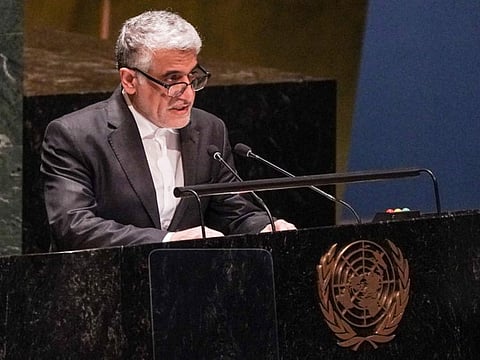Iran likens its link with militia proxies Hamas, Hezbollah and Houthis to Nato
We have some coordination, cooperation, consultation and maybe some financing: UN envoy

New York: An Iranian diplomat likened Tehran’s alliance of militias across the Middle East to the Nato military alliance, denying that his country has direct control over the groups as they brace for more US strikes against them.
“The relationship between Iran and the resistance groups in this region may be compared with the Nato treaty,” Iran’s ambassador to the United Nations, Saeid Iravani, told NBC News in an interview.
He delivered his comments with a wry smile, even as regional tensions threaten to boil over.
Iravani was referring to Iran-backed militia groups such as Hamas, Hezbollah and the Houthis, referred to as the “Axis of Resistance” in Tehran, which have burst onto the global spotlight since Hamas’s October 7 attack on Israel triggered the ongoing conflict in Gaza.
The Yemen-based Houthis have gone on to upend global trade by attacking shipping in the Red Sea, while persistent attacks on US regional bases blamed on other groups culminated in the killing of three American soldiers in Jordan late last month.
President Joe Biden’s administration has responded with a series of airstrikes since Friday and has vowed to take further action, while insisting the US doesn’t want to be pulled into a prolonged regional conflict.
Hamas, the Houthis and Hezbollah, a Lebanon-based group that has traded cross-border fire with Israel since October 7, are designated terrorist organisations by the US.
“We have some coordination, cooperation, consultation and maybe some financing,” ravani said about Iran’s relationship with the proxies.
Own choices
But “they have their own choices,” he said, when it comes to military activities.
In a letter to the UN Security Council, Iravani denounced “baseless accusations” that it was behind the attacks on US facilities and said the “illegal” response carried out by Americans over the weekend is putting international peace at risk.
“These unlawful operations deliberately targeted civilians and essential infrastructure, resulting in numerous civilian casualties and injuries,” Iravani wrote on Tuesday.
Robert Wood, the alternate US ambassador to the UN, told the Security Council on Monday that “we are not seeking a direct conflict with Iran” but “we will continue to defend our personnel against unacceptable attacks. Period.”
Nato comparison
Iravani’s suggestion that the proxy groups are acting independently contrasts with Nato’s practice of explicit cooperation on military strategy.
The North Atlantic Treaty Organisation, a 31-member military alliance of which the US is the biggest funder, was formed as a way to ensure collective security after the Second World War. The group last year added Finland to shore up its eastern front following Russia’s war in Ukraine, while Sweden is seeking to join for the same reason.
Nato’s provisions include a commitment for members to support each other’s capacity to resist armed attack, consult on military matters and consider an attack on one as an attack on all.
Iran has openly backed — and sometimes helped create — armed groups across the region that share its enmity with Israel and the US but denies having a role in individual operations and so far hasn’t publicly come to the aid of Hamas.
Sign up for the Daily Briefing
Get the latest news and updates straight to your inbox



